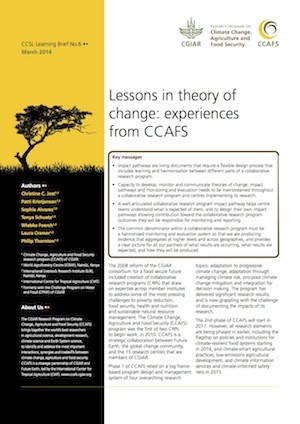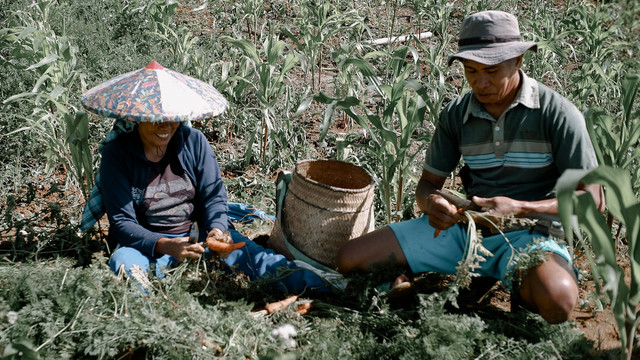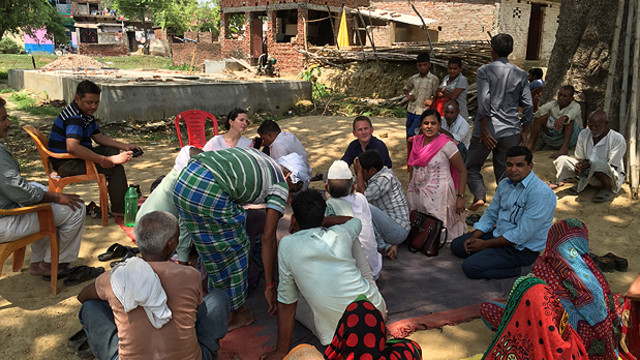How do we best create long-term impact that matters to smallholder farmers?
Research deliverables, such as articles and briefs, are aimed to change the way people do things, and in the end help create something better. But we already know that outputs will not automatically lead to impact, which in our case would be improving the well-being of smallholder farmers.


We need a plan. A plan that will guide us towards achieving real impact for smallholders. We are now documenting our work on creating Impact Pathways and Theories of Change in a new Learning Brief (Photo: G Smith/CCFAS)
So, what we need is a vision and a solid plan for the steps involved between ensuring an output – a report or tool – also achieves impact for smallholders.
This plan is something we call "Impact Pathways", in turn supported by a Theory of Change. The Theory of Change recognises the strategies needed, the assumptions we make, and the actors we must involve to move from one step in the pathway, to another.
In an effort to practice what we preach – openness and transparency – we are now publishing a Learning Brief that captures the lessons we've learned while working on building a Theory of Change and Impact Pathways that will guide our work from hereon. The brief Lessons in theory of change: experiences from CCAFS is being published together with the International Institute for Environment and Development (IIED).
The hope is that the brief will assist other programs and organisations that are going through similar changes, and guide our partners and staff members at the same time.
This Learning Brief is part of a series that will showcase lessons learned through various internal program activities. A few have already been published and we have more in the pipeline. The documents are part of our work on Climate Change and Social Learning.
Why change the way we do our research?
This research overhaul springs from CGIAR's new vision to conduct agriculture research differently, both at the higher levels and within the Research Centres and Programs. "Differently" here means allowing the research to be guided by an explicit Theory of Change, including a detailed Impact Pathway that will support better monitoring and evaluation of outcomes and impacts.
We have already started adopting CGIAR's research reform as we are in full-swing planning for the next phase of our program, which includes the establishment of four Flagships that contribute to five different Intermediate Development Outcomes in all of our regions.
Learn more about the new "program model" set to be rolled-out next year.
This work is coordinated through our cross-cutting research theme on Linking Knowledge to Action, and is closely connected to our work on Climate Change and Social Learning.
What we are learning through the process
Truth of the matter is, when we started this process we didn't know what makes a Theory of Change realistic or an Impact Pathway effective, but as we are pushing the finalisation of these two activities for our Flagship 4 on policies and institutions for climate-resilient food systems, it is becoming clear that the internal capacity is being built up step-by-step.
Learn more: Draft first part of the Impact Pathway for Flagship 4: Policies and institutions for climate-resilient food systems (PDF)
For us, we've also realised that our regions need to develop their outcomes and actions before our flagships can build their Impact Pathways (IPs). Most of the four Flagship pathways will actually be captured in the regional IPs.
This process has also taught us how important it is to develop a monitoring and evaluation system (M&E) in parallel with our impact pathway, so that they feed into each other. We will report on development of the CCAFS M&E system in our next Learning Brief.
Working group on Impact Pathways met up in Spain
We are also building the needed skills within our regions and Flagship-groups, as well as Centres that we work closely with. Last week was the first time participants from our newly set-up Working Group on Impact Pathways got to meet in a participatory, week-long training, trying to get people to start developing their own ToC and accompanying Impact Pathways.
During the training it became clear that many are starting from scratch, without previous knowledge of how to ensure all project activities lead to set Mid-Outcomes and overarching Outcomes that are the same across the CGIAR. More importantly, how do you monitor and evaluate effectively to measure impact and success? And for CCAFS Flagships, which indicators do you use, that are the same across regions, to compare results?
Despite feeling overwhelmed and everyday having to break new ground to better understand our own transformation, many were still able to put together draft Impact Pathways, while building on the underlying theories on how these changes will occur, and setting a time line for when this process will have to produce some final results.
Key messages from our Learning Brief:
- You can't be too rigid with your Impact Pathway: An IP is a living document that requires you to be flexible in your design and make space for new insights along the way. As one participant said during the training last week: "Your Impact Pathway is a living beast, it is not a fixed product"
- You need to develop internal capacity to, not only develop theories of change, impact pathways and monitoring and evolution tools, but staff needs to be trained on how to monitor the progress and communicate the ongoing activities both internally and externally
Read the rest of the key messages in the Learning Brief: Lessons in theory of change: experiences from CCAFS, prepared by Jost C, Kristjanson P, Alvarez S, Schuetz T, Foerch W, Cramer L, Thornton P. 2014.
Learn more: Understanding "Theory of Change" in International Development: A review of Existing Knowledge (PDF).
Cecilia Schubert works as a Communications Officer for CCAFS. This blog was orginally posted on the CCFAS website on 7 April.




